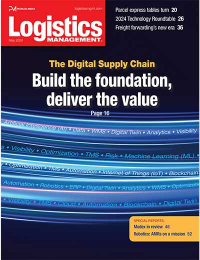Reusable plastic containers show benefits over one-way corrugated boxes in new life cycle study
RPCs reduce solid waste and use less water and energy across produce applications
Latest Logistics News
STB Chairman Martin J. Oberman retires LM reader survey drives home the ongoing rise of U.S.-Mexico cross-border trade and nearshoring activity USPS cites continued progress in fiscal second quarter earnings despite recording another net loss U.S. rail carload and intermodal volumes are mixed, for week ending May 4, reports AAR New Ryder analysis takes a close look at obstacles in converting to electric vehicles More NewsIFCO Systems, a global leader in reusable plastic containers (RPCs) for fresh products, recently released a study confirming RPCs as a sustainable packaging option. The report shows the IFCO solution generates 82% less solid waste, consumes 92% less water, requires 49% lower energy demand, and lowers ozone depletion by 76% for a weighted average of 10 top produce commodities compared with shipping the same amount of produce in display-ready corrugated boxes. The report was produced by Franklin Associates, a Division of ERG, a leading consulting company specializing in life cycle analyses and solid waste management.
IFCO President & General Manager, USA, Fred Heptinstall, said: “We are delighted with the third party validation that our business processes are effectively managing resources, and are thrilled the report from Franklin Associates confirms the positive impact our customers continue to make on environmental sustainability. IFCO is committed to proper stewardship of our natural resources and this study proves our efforts continue to reap extraordinary results throughout the supply chain.”
The study results mean that for every 1,000 pounds of produce shipped in IFCO RPCs instead of display-ready corrugated boxes, growers and retailers save approximately 13 pounds of solid waste, 700,000 British Thermal Unit (BTUs) of energy (equivalent to five gallons of diesel) and 360 gallons of water.
Franklin Associates’ Rebe Feraldi, the certified life cycle analysis practitioner who was the primary analyst for the project, said: “Our study shows that the environmental benefits of IFCO RPCs are primarily due to the benefits of container reuse. While corrugated containers incorporate recovered fiber and are recycled at high rates, they must be manufactured and recycled for each produce shipment made in a single-trip container.” She continues, “The steady-state reuse process of delivering produce with RPCs only consumes about 33/1000ths of the RPC container material per use cycle compared to 100 percent material manufacturing and recycling required per use with shipments made in single-use fiber containers.”
The Franklin Associates life cycle analysis for IFCO was submitted to a peer review, which was conducted by Dr Susan Selke of the School of Packaging at Michigan State University (serving as review chair); Mary Ann Curran, former Manager of the Life Cycle Assessment Research Center at the US Environmental Protection Agency’s Office of Research and Development, and Shelie Miller of the Center for Sustainable Systems School of Natural Resources & Environment at the University of Michigan. The peer review panel performed its review and no methodological revisions were requested; only minor clarifications and augmentations to the report body discussions.

Article Topics
Latest in Logistics
Automate and Accelerate: Replacing Pick-to-Light with the Next Generation of Automation STB Chairman Martin J. Oberman retires LM reader survey drives home the ongoing rise of U.S.-Mexico cross-border trade and nearshoring activity A buying guide to outsourcing transportation management SKU vs. Item-level Data Visibility: Why it Matters for End-to-End Traceability Key benefits of being an Amazon Business customer with Business Prime USPS cites continued progress in fiscal second quarter earnings despite recording another net loss More LogisticsSubscribe to Logistics Management Magazine

Find out what the world's most innovative companies are doing to improve productivity in their plants and distribution centers.
Start your FREE subscription today.
May 2024 Logistics Management

Latest Resources














